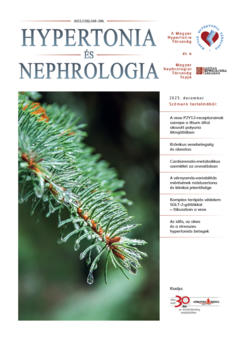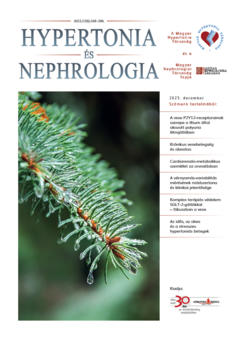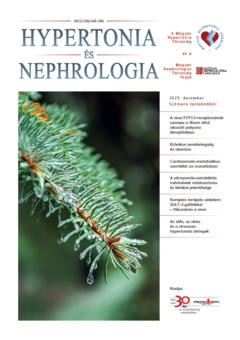The eLitMed.hu medical portal uses computer cookies for convenient operation. Detailed information can be found in the Cookie-policy.
Specialities
Cardiology
[Pharmacotherapy of chronic heart failure with reduced ejection fraction: vericiguat, the developing 5th pillar? ]
[The incidence and prevalence of chronic heart failure (HF) is increasing worldwide, its morbidity and mortality remains high, and its adequate management is of paramount importance. Currently the treatment of heart failure with reduced ejection fraction (HFrEF) relies on four pillars: ACE inhibitors/ARNI, β-blockers, MRAs, and as the newest class, SGLT-2 inhibitors, all of which have been proven to reduce mortality and morbidity in HFrEF patients. A relatively new therapeutic option for the pharmacotherapy of HFrEF is vericiguat a soluble guanylate cyclase stimulator, which modifies the NO-sGC-cGMP signaling pathway impaired in heart failure patients. Vericiguat activates the sGC enzyme independently of the presence of nitric oxide, resulting in elevated intracellular cGMP levels, which can improve endothelial, myocardial, and vascular functions alike. Safety and efficacy of vericiguat were confirmed in the VICTORIA trial. Vericiguat significantly reduced the composite endpoint of HF hospitalization and cardiovascular death compared to placebo in chronic HF patients recently hospitalized for HF or requiring parenteral diuretic therapy with an ejection fraction worse than 45%. The relative risk reduction was 10%, and the absolute risk reduction was 4.2% in the vericiguat group. Due to the positive outcomes observed in the VICTORIA trial, vericiguat was included as a new pharmacotherapeutic option in the 2021 ESC Heart Failure guidelines. The current recommendation suggests the use of vericiguat with a level IIb evidence for HFrEF patients who recently required medical care due to heart failure progression despite optimal pharmacotherapy. ]
[Reno- and cardioprotective effects of sodium-glucose cotransporter 2 inhibitors beyond treating diabetes mellitus ]
[SGLT2-inhibitors, originally used as antidiabetics, improved unexpectedly the outcome of cardiac diseases (mainly heart failure) and nearly halved the risk of renal events of diabetic patients. More recently, administering these drugs decreased significantly the morbidity and mortality in primary renal endpoint studies and among patients with heart failure – in diabetic and non-diabetic patients respectively. Concerning these recent outcomes and according to international and domestic guidelines, SGLT-2 inhibitors are considered as first line medications in both chronic kidney disease and the whole spectrum of chronic heart failure, and they should be initiated as early as possible in these conditions. Since the beginning of 2024, these drugs which changed significantly the outcome of these diseases can be prescribed with greater support of Hungarian public financing not only for type 2 diabetic patients but non-diabetics too with chronic kidney diseases and heart failure with reduced ejection fraction. ]
[The place of rosuvastatin/acetylsalicylic acid fixed combination in the daily practice ]
[In Hungary, cardiovascular diseases are the leading cause of death; however, they have also a large share among preventable and treatable conditions. Statins and acetylsalicylic acid (ASA) play a prominent role in the secondary prevention of cardiovascular diseases. Their areas of application are wide, but at the same time, they are recommended for secondary prevention of many common cardiovascular diseases. Among acetylsalicylic acid and statin combinations, the ASA/rosuvastatin combination – if compared to other statins – reduced most significantly the risk of cardiovascular diseases. Other studies have highlighted the benefits of fixed drug combinations in cardiovascular risk reduction.
A new domestic fixed combination, containing that of ASA/rosuvastatin can claim a prominent position in the secondary prevention of cardiovascular diseases.]
[Chronic kidney disease and obesity]
[Nowadays, the epidemic spread of obesity is mainly linked to changing environmental factors and is a serious public health problem. Obesity alone can be associated with increased mortality, but obesity is also an independent risk factor for several chronic diseases such as diabetes, hypertension and chronic kidney disease which have a major public health burden.]
[Elderly, obes and stressed hypertension patients]
[Increased sympathetic nervous system activity can be found in all forms of hypertension, but the degree of this may differ depending on the individual accompanying diseases.]
[Methodology and clinical relevance of measuring blood pressure variability based on the consensus paper of the European Society of Hypertension]
[Blood pressure is an ever-changing vital parameter. Its observed variability over time is blood pressure variability, which is influenced by both regulatory mechanisms within the body and environmental factors affecting the body.]
1.
Clinical Neuroscience
Is there any difference in mortality rates of atrial fibrillation detected before or after ischemic stroke?2.
Clinical Neuroscience
Factors influencing the level of stigma in Parkinson’s disease in western Turkey3.
Clinical Neuroscience
[The effects of demographic and clinical factors on the severity of poststroke aphasia]4.
Clinical Neuroscience
Neuropathic pain and mood disorders in earthquake survivors with peripheral nerve injuries5.
Journal of Nursing Theory and Practice
[Correlations of Sarcopenia, Frailty, Falls and Social Isolation – A Literature Review in the Light of Swedish Statistics]1.
2.
3.
4.
5.








